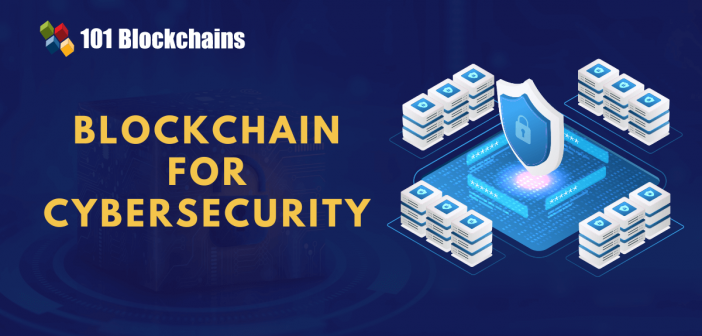Learn how blockchain truly works, master key definitions, and uncover what makes smart contracts so "smart." Dive into the fundamentals, gain valuable insights, and start your blockchain journey today!

- Blockchain
James Howell
- on June 13, 2023
How Blockchain can help fight Cybercrime?
The benefits of digital transformation have served to promise advancements in different sectors. However, the transition of business operations, governance processes and financial transactions to digital platforms has created problems with cybersecurity. The personal and financial information of billions of digital service users worldwide is at risk of prominent threats, such as phishing attacks.The applications of blockchain for cybersecurity have the potential to provide a secure environment for users and businesses. Annual costs of cybercrime can climb up to $8 trillion by 2023.
The damage inflicted by cybercrime in 2022 amounted to $6 trillion, with almost $4.5 million in losses on average for a business. Therefore, the urgency for addressing cybercrime requires innovative solutions like blockchain technology. The following post reflects on different ways in which blockchain can enhance the cybersecurity landscape in 2023.
General Attacks in Cybercrime
Before you find out how blockchain fights cybercrimes, it is important to learn about the common threats to cybersecurity. One of the significant setbacks of the existing design of the internet is centralization, which creates single points of failure. On top of it, hackers don’t have any difficulties in maintaining anonymity and overcoming resistance to attacks.
Denial of Service of DDoS attacks is one of the common examples of cyber threats which can affect the operations of a business. The examples of blockchain cybersecurity use cases are essential for avoiding the negative impact of cybercrime. Cybercrimes can lead to disruption of services or theft of sensitive data. In some cases, malicious agents can also target public infrastructure through power outages and other types of unauthorized actions.
Apart from Denial of Service attacks, the list of threats in cybersecurity also includes phishing and ransomware attacks. Phishing attacks utilize social engineering techniques to compromise valuable and sensitive information. On the other hand, ransomware attacks could disable the operations of a company until they pay a ransom to the hacker.
The threat of a wide variety of security risks and the mounting economic burden of cybercrime are strong reasons to look for innovative solutions. How can blockchain provide security for the massive repositories of financial data generated every day? Can blockchain provide security for social media identity management? Will blockchain improve the security of the existing solutions without the need for a complete makeover?
Impact of Blockchain on Cybersecurity
The different questions regarding the effect of blockchain on cybersecurity draw attention to the important traits of blockchain. The answers to “Is blockchain safe from cyber-attacks?” and other queries regarding the potential of blockchain technology for cybersecurity would focus on the following factors.

-
Decentralization Benefits
The first advantage of blockchain, which would favor cybersecurity, is the decentralization factor. Blockchain technology can help in developing decentralized security systems, which can replicate data throughout different nodes in a network. Hackers would have to invest a lot of time and resources in compromising multiple nodes on the blockchain network, thereby ensuring better improvements in security. You can identify how blockchain fights cybercrimes by safeguarding applications, systems and data from malicious agents by using decentralization.
-
Immutability
The next crucial trait of blockchain technology refers to immutability, which implies that it is impossible to modify or delete information after adding it to the blockchain. Once a transaction has been registered on blockchain, there is no way to delete it from the chain. In addition, blockchain cybersecurity use cases can also leverage immutability for tamper-proof audit trails alongside documenting transaction logs. Blockchain makes it almost impossible to modify or create false evidence of data and transactions, thereby helping in effective detection and prevention of fraud.
-
Security of Smart Contracts
Smart contracts are another prominent highlight in the domain of blockchain. The applications of blockchain in cybersecurity could find better value benefits with smart contracts. The automated, self-executing contracts deployed on blockchain networks serve as critical elements in the blockchain landscape.
Blockchain cybersecurity use cases with smart contracts can also help in leveraging the advantage of automation to improve process efficiency. In addition, the flexibility for programming smart contracts allows better flexibility for achieving cybersecurity advantages. You should also identify how smart contracts improve security by providing a trustless environment through exclusion of intermediaries.
Excited to learn about the critical vulnerabilities and security risks in smart contract development, Enroll now in the Smart Contracts Security Course!
-
Cryptographic Advantage in Security
Another promising advantage associated with blockchain for addressing cybersecurity problems is the assurance of cryptographic security. You can answer “Is blockchain safe from cyber-attacks?” by reflecting on the utilization of cryptographic hashes alongside digital signatures to avoid issues in data tampering. The basic design of blockchain focuses on ensuring the integrity of data stored on it.
Decentralized Identity
The benefits of blockchain for cybersecurity also include an emphasis on decentralized identity. The benefits of decentralized identity management systems can help people control identity information alongside reducing the risks of identity theft. On top of it, users would not have to reveal their personal information on every platform for accessing digital services.
Blockchain helps in preventing data breaches, criminal acts, cyber-attacks and identity theft. As a result, it can contribute to security and privacy of data. Furthermore, consensus mechanisms also provide an effective boost for cybersecurity with blockchain. The key highlights which define the role of blockchain in fuelling cybersecurity advantages include the following,
- Distributed ledger technology and immutability
- Security identity and access management
- Decentralization and freedom from intermediaries
- Decentralized consensus mechanisms
- Traceability and transparency for transactions
- Smart contracts, peer-to-peer networks and cryptographic key security
Excited to learn the concept of decentralized identity on existing digital ecosystems? Enroll in Decentralized Identity Fundamentals Course Now!
Additional Layers of Security with Blockchain
Blockchain technology can provide viable advantages for cybersecurity with some more features. You can find different types of access management systems which can help in boosting security with blockchain. In addition, it is important to understand the possibilities of crypto cyber crime as malicious actors always find out vulnerabilities in new technologies. The important highlights of the infrastructure for blockchain applications in cybersecurity include Public Key Infrastructure and Domain Name System.
Public Key Infrastructure, or PKI, relies on a smart contract that can be configured for authentication purposes. On the other hand, Domain Name System takes a page from the traditional DNS infrastructure for resolving spoofing attacks with blockchain. In addition, another promising addition to the use of blockchain in cybersecurity refers to the use of Zero Knowledge Proofs or ZKPs.
Zero-Knowledge Proofs have offered a promising solution for resolving the problem of disclosing identity information for processing transactions on blockchain networks. As a result, users can validate transactions on blockchain by revealing only the information required for validating their identity. For example, you don’t have to show your driver’s license when you are asked for age verification with ZKPs.
Want to get indept understanding of Zero-Knowledge Proofs, Enroll Now in Zero Knowledge Proofs (ZKP) Masterclass
Examples of Blockchain Applications in Cybersecurity
The next step in understanding the impact of blockchain on cybersecurity would focus on a review of the examples of blockchain use cases for cybersecurity. Blockchain has served as the foundation of the security infrastructure of many applications in different sectors. Here is an overview of the different use cases of blockchain for transforming cybersecurity.
-
Cryptocurrency Trading
The first application of blockchain, i.e., cryptocurrencies, such as Bitcoin, resulted in a massive impact which led to the birth of many new cryptocurrencies. Examples of blockchain cybersecurity use cases in crypto trading refer to the Coinbase crypto exchange, which leverages a secure blockchain platform. It stores the passwords of users in secure databases and employs rigorous background checks to confirm safety of crypto assets. Coinbase relies on smart contract-based encryption to provide secure crypto trading advantages.
Another example of blockchain applications in cybersecurity refers to the facility of decentralized storage methods alongside encryption methods and comprehensive public ledger systems. The Founders Bank, which has the vision of becoming the first decentralized bank in the world, leverages decentralized storage methods and encryption technologies for security user and transaction data.
Want to get an in-depth understanding of crypto fundamentals, trading and investing strategies? Enroll now in Crypto Fundamentals, Trading And Investing Course.
-
Uses of Blockchain in Banking
The applications of blockchain for improving cybersecurity also focus on the banking and financial services sector. Banking institutions can find effective ways to leverage the capabilities of crypto cyber crime fighting abilities to their advantage. Some of the biggest names on Wall Street, such as JP Morgan and the Bank of America, have noticed the possibilities for using blockchain to have improved security protocols.
JPMorgan Chase has developed a private blockchain based on the architecture of Ethereum, known as Quorum. It leverages blockchain technology for processing private transactions. JPMorgan Chase utilizes smart contracts on Quorum network for implementing cryptographically verified and transparent transactions.
In the UK, examples of blockchain for cybersecurity refer to the role of Santander US in adoption of blockchain. The bank used blockchain for safeguarding their international payments service across Santander accounts in South America and Europe. Barclays Bank in England has also filed a patent for using blockchain technology to improve security in financial transactions.
Want to understand how blockchain is changing finance industry and how companies are using this technology? Checkout the presentation on Blockchain in Finance
-
Blockchain for Patient Record Safety
The healthcare industry is also another vulnerable target of cybercrime, like the banking sector. Therefore, it is important to find how blockchain fights cybercrimes in the healthcare sector with examples of some popular projects. Healthcare service providers store vital information about the health records of patients alongside financial information regarding payments.
Philips Healthcare in Cambridge, Massachusetts, has paired up blockchain and AI to create a new and secure healthcare ecosystem. The company collaborates with different hospitals worldwide and utilizes AI for discovering and analyzing different aspects of healthcare data.
Health Linkages in California utilizes blockchain to improve transparency in data governance by enabling auditable analytics. It also focuses on the effective use of blockchain in cybersecurity to improve compliance within the healthcare domain. The company utilizes blockchain to allow only authenticated agents to share patient data.
Medicalchain in London is another company that has used blockchain to improve its cybersecurity posture. It uses blockchain to enable patients and healthcare professionals with instruments for accessing patient data. Interestingly, Medicalchain does not store patient data directly on the blockchain while also ensuring ease of accessibility.
The different examples of blockchain applications in cybersecurity provide answers to the doubts about crypto cyber crime use cases. Blockchain technology can deliver a significant value advantage for improving security across different sectors which calls for broader adoption. In addition, the examples of blockchain applications in cybersecurity prove the feasibility of using it as a viable alternative to existing security mechanisms.
Start learning Blockchain with World’s first Blockchain Skill Paths with quality resources tailored by industry experts Now!
Conclusion
The detailed insights on the potential of blockchain for cybersecurity show that it can have a transformative impact on cybersecurity. Blockchain technology leverages the benefits of decentralization and immutability for ensuring basic security by design. In addition, smart contracts help in providing end-to-end security for all transactions of information and value on blockchain networks.
The innovation in blockchain technologies, such as the introduction of zero-knowledge proofs, can serve crucial value advantages for businesses. However, it is also important to learn the best practices for leveraging blockchain solutions to improve or replace existing security systems. Learn more about blockchain and its role in improving cybersecurity with comprehensive training resources right now.
*Disclaimer: The article should not be taken as, and is not intended to provide any investment advice. Claims made in this article do not constitute investment advice and should not be taken as such. 101 Blockchains shall not be responsible for any loss sustained by any person who relies on this article. Do your own research





